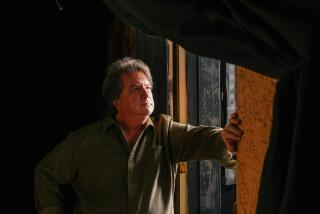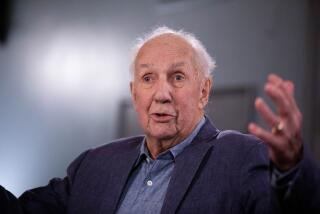Bernard Weinraub explores media frenzy in ‘Above the Fold’
As a reporter covering Hollywood for the New York Times, Bernard Weinraub was amused whenever producers or studio executives were unable to remember the names of the screenwriters of their latest films.
“They would actually say, ‘I’m not sure,’ or ‘A couple of people.’ Very few of them actually knew who wrote the movie,” Weinraub said. “It always cracked me up. It’s such a collaborative process. Obviously, that never happens in the theater.”
So when Weinraub retired from journalism in 2005 and began a second career as a playwright, he thought he would wield more clout than Hollywood screenwriters.
Well, maybe not....
PHOTOS: Best in theater 2013 | Charles McNulty
“I mean, David Mamet has clout. Edward Albee has clout. I don’t have clout,” Weinraub deadpanned over lunch during rehearsals for his new play, “Above the Fold,” which opens Feb. 5 at the Pasadena Playhouse.
“I was told early on that legally, under the rules, I have the power to veto an actor,” Weinraub said. “The trouble with me, to be honest, is that I went to the tryouts and I liked every actor. So, then I realized, this is ridiculous.... I was not a good judge of anybody. I exercised absolutely no power.”
Directed by Steven Robman, “Above the Fold” stars Oscar- and Emmy-nominated actress Taraji P. Henson as a journalist from a major northeastern newspaper who covers a racially explosive rape case in a Southern university town.
During rehearsals, Henson’s character, Jane, and Monique (Kristy Johnson), a mother of two who earns spending money stripping, make compelling antagonists. Monique, who is African American, sets off a media frenzy when she claims she has been raped by three white frat boys during a private party where she had been hired to dance.
At first, they hit it off.
PHOTOS: Faces to watch 2014 | Theater
“Look at those shoes,” Monique tells Jane. “Those are — money shoes. You’ve got to make money. You on TV.”
“No, Monique,” Jane replies. “I write for a newspaper. The TV people make money; we don’t.” She gives her stylish shoes to Monique and they seem to bond.
But the two women lock horns when troubling revelations throw into doubt some of the stories Jane has written for her paper.
Watching the two actresses rehearse, Weinraub said, “… It was so powerful. They were grabbing each other, holding each other. I said, ‘Oh, my God, never in my wildest dreams did I imagine this kind of thing happening.’ They brought so much to the roles.
“What I realized is that once the actors start rehearsing, it isn’t quite out of your hands but it really is out of your hands,” he said. “The actors bring their own personas, their own dynamics, their own relationships. So, for a writer, there are constant surprises during the rehearsal process.”
PHOTOS: Arts and culture in pictures by The Times
The play is inspired by a 2006 criminal case in which three members of the Duke University lacrosse team in Durham, N.C., were accused of raping an African American student from another university who worked as a stripper. The media descended on the university, and the case inflamed racial tensions. All charges were eventually dropped, and a state investigation concluded there had been no rape or assault.
It was the media coverage that piqued Weinraub’s interest.
“The case itself, to be honest, did not interest me that much,” he explained. “I was interested in … how the press dealt with it.... So I began thinking, what happens to a reporter in the world I grew up in who goes down to cover a story like this? And the pressures the reporter faces? And the political nature of this, in the fact that we all believed at the very outset that the boys were so obviously guilty. Everybody believed this, including newspapers.”
Is Weinraub taking shots at his former employer in his play? Weinraub says he is not singling out the New York Times and emphasized that all the characters in his play are fiction.
Still, because of his years working at a major newspaper, Weinraub is familiar with the internal debates that arise over controversial stories. With themes like race, North versus South, and rich versus poor, Jane’s editors willingly provide front page space for the reporter’s stories as new facts emerge.
Jane “gets swept up in that in a very natural way,” Weinraub notes. “She is not, in any way, a malevolent person. She is very ambitious and hungry but there is nothing malevolent about her.... Any journalist can fall victim to preconceptions. And because she’s first on the story, she’s leading the charge.”
CRITICS’ PICKS: What to watch, where to go, what to eat
nown as Bernie to his friends and colleagues, Weinraub, 75, rose from a New York Times copy boy in the mid-1960s to a foreign correspondent in Vietnam, London and India, and then covered politics and the White House in Washington, D.C., during the Reagan and first Bush presidencies. In 1991, he headed west to become the Times’ film industry reporter.
Weinraub’s relationship with and 1997 marriage to Amy Pascal, who today is the co-chairman of Sony Pictures Entertainment, became the talk of Hollywood. When they began dating, he said, Pascal headed Turner Pictures, but soon she moved over to Columbia Pictures, which Weinraub regularly covered.
“I thought, well, I can handle this since Turner Pictures was a minor player,” Weinraub recalled. “…[But] once she moved to Sony, I couldn’t.”
While Weinraub had voluntarily avoided writing about Sony, rival studios were still suspicious of whatever he wrote.
“It was foolish of me to think I could avoid it with other major studios. If I said, ‘Warner Bros. had a lousy weekend [at the box office] last weekend,’ they would say I wrote that because Sony has a picture coming out next week.... It was the last thing in my mind that Sony had a picture next week and last week Warner Bros. had this bomb. But I realized it was so delicate.”
“The Times was very nice,” he said. “[They] put me on [the] television [beat]. But at the time, my heart wasn’t in television.”
Married 16 years, Weinraub and Pascal have a 13-year-old son, Anthony, who Weinraub says doesn’t appear interested in films at this stage of his life. He has two children from a previous marriage — Claire, a producer at ABC News, and his older son, Jesse, who works on the documentary side at HBO.
When Weinraub left the paper, he decided to do something that he had wanted to do for years — write plays. Since he was a teenager he had harbored a love of the theater and had taken courses in playwriting both in New York and at UCLA.
“Above the Fold” is Weinraub’s second play. His first, a Holocaust-themed drama called “The Accomplices,” was produced by the New Group in New York and the Fountain Theatre in L.A.
For “Above the Fold,” Weinraub found a champion in director Robman, a newspaper junkie who believes audiences can get valuable insight through the play into how biases can shape news coverage. After a series of well-received readings, Robman took the script to Pasadena Playhouse artistic director Sheldon Epps, who liked it so much he gave the green light to put it in production.
Weinraub said he has shown his new play to some screenwriters and they’ve given him valuable advice. But, he has to admit, “You’re sort of a slight freak if you write a play here [in Hollywood].”
----------------------
Contact: https://www.PasadenaPlayhouse.org or (626) 356-7529
‘Above the Fold’
Where: Pasadena Playhouse, 39 South El Molino Avenue, Pasadena
When: Opens Feb. 5. Tue.-Sat. 8 p.m., Sat 4 p.m., Sun. 2 and 7p.m.
Tickets: $38 to $72
More to Read
The biggest entertainment stories
Get our big stories about Hollywood, film, television, music, arts, culture and more right in your inbox as soon as they publish.
You may occasionally receive promotional content from the Los Angeles Times.






